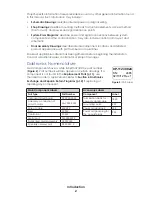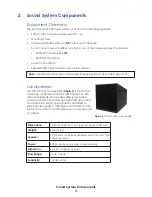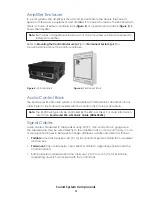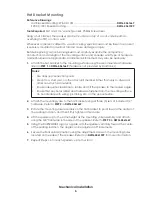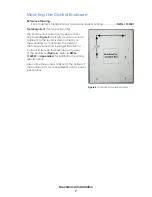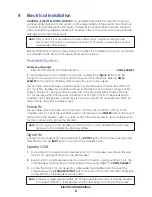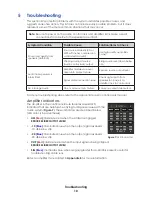
Electrical Installation
9
Permanent System
Reference Drawings:
Riser; SS-200, Electrical, Permanent System ...................................................
DWG-4306294
In a permanent system, the amplifier is housed in a wall-mounted rack (
DWG-4306294
for a typical permanent system setup with up to four speakers.
The permanent system requires local 1-gang junction box(es) mounted within 30' (9.1 m)
of the speaker(s). The wall-mounted amplifier rack is mounted up to 250' (76.2 m) from
the local 1-gang junction box(es). This provides a maximum of 280' (85.3 m) from the
speaker(s) to amplifier rack.
Power IN
The permanent system requires one (1) 20 amp, 120 VAC circuit within 3' (0.9 m) of the
amplifier rack. Connect the included power cord between the
POWER
inlet on the rear
of the amplifier and the nearby outlet.
Signal IN
1�
Install a signal input plate near the desired control location.
2�
Route 1-pair, 22 AWG audio signal cable in conduit into the amplifier enclosure and
terminate to
ROUTABLE INPUT 1
on the rear of the amplifier.
3�
Connect the included XLR cable between the
OUTPUT
jack of the control rack
(typically the SSR-AM) and the signal input plate.
Speaker OUT
1�
Connected to the rear of each speaker is a 30' (9.1 m) speaker wire. Route this wire
to a local 1-gang junction box, one per speaker.
2�
Route 1-pair, 12 AWG speaker wire in conduit from each local 1-gang junction box to
the rear of the amplifier (inside the enclosure) and terminate per the wiring diagram
in
DWG-4306294
.
Note:
If there is a single speaker within 30' of the permanent amp rack, it may be
possible to connect directly to the amplifier using no local junction boxes.
Grounding
All components of an audio system – including but not limited to control equipment,
and connected peripheral equipment – must be electrically grounded. Only qualified
individuals may perform electrical work, including verification of ground resistance.
Daktronics is not responsible for improper grounding or damage incurred as a result of
improper grounding.
Grounding methods must meet the provisions of all applicable local and national codes.
Inspect and verify all grounding methods meet the provisions of all applicable local and
national codes.
Proper grounding is necessary for reliable equipment operation and general electrical
safety. Failure to properly ground the sound system may void the warranty, disrupt
operation, damage equipment, and cause bodily harm or death.






